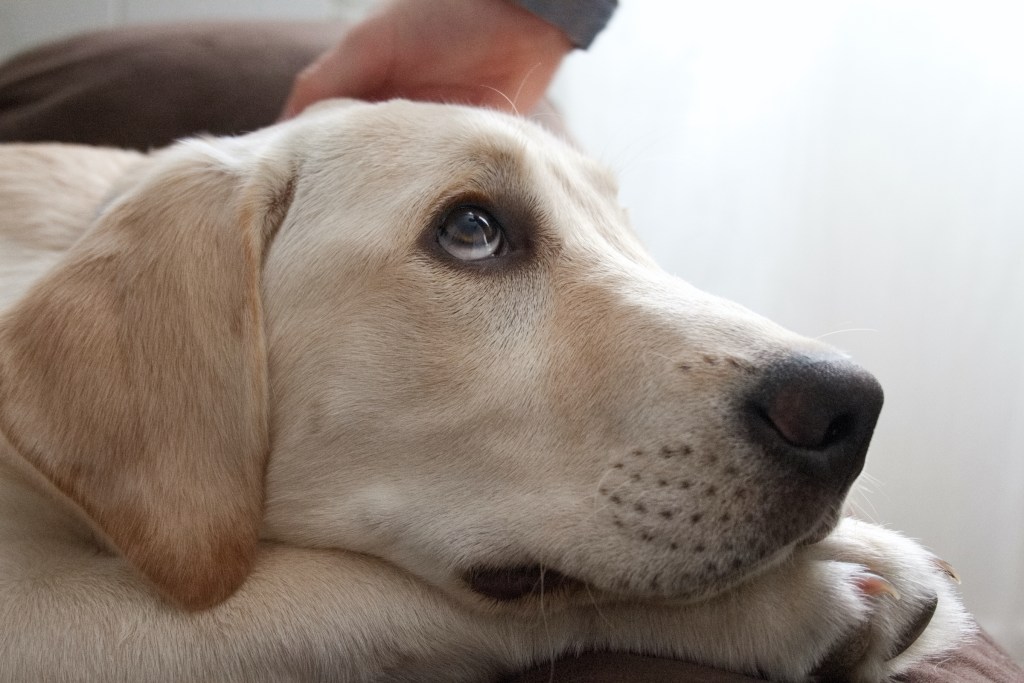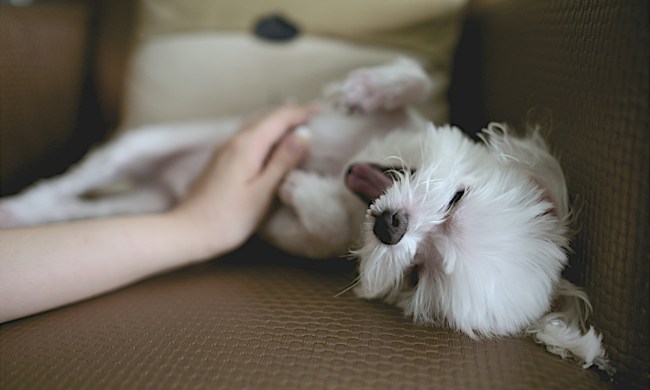Ah, the sigh, a universally recognized symbol of sleepiness, relaxation, or even boredom. As easy as it is to identify this sound in people, can we say the same for the many noises dogs make? Well, yes and no. There can absolutely be moments when your dog expresses their sleepiness with a sigh, but there are also a number of other reasons why a little sound escapes their snoot. Most are completely harmless (and totally adorable) but there are a few behavior patterns to keep an eye out for — just in case!
Take sighing, for example. Humans sigh for a variety of different reasons, including when we’re overwhelmed or unhappy. So, why do dogs sigh? Here are the most common reasons.

Why do dogs sigh?
Remember — since canines can’t speak the same way people can, they rely a lot more on their other senses to communicate. This includes vocalizations like growling, barking, grumbles, and sighs. Here’s what those sighs may mean.
Contentment and relaxation
When your pup lets out a sigh as they plop down or curl up for a nap, you can be pretty sure it’s a sign of contentment. You may also notice this habit shortly after a meal, or when things calm down after playtime, notes Professor Stanley Coren. Take a second to ponder whether your dog’s sigh could be related to a recent happy event.
Even if they’re snuggled up next to you as they exhale, they’re likely just comfy. One way you can know is by looking at your dog’s eyes; a relaxed pup will keep their eyes only partially open. When their eyes are wide open for a sigh — well, just keep reading!
Disappointment
If your pup lets out a long sigh with their eyes wide open, they’re not a happy camper. They’re not angry or afraid, or even sad necessarily, but instead were likely expecting more of a treat, walk, or greeting than they got. Sighing is not an extreme expression of emotion by any means, so don’t be hard on yourself if you think your pup might be a bit disappointed. Things happen: busy days, rainy weather, or a case of the blues — we can’t have a perfect day every day. It’s okay!
Deep sleep
If your furry friend gives off a sigh while they’re already resting, it can simply mean they’re getting some high-quality, truly deep sleep (and that you should be completely jealous). “These sighs,” notes SFGate, “seem to mark a physiological transition into a deeper state of relaxation.”
You may notice your dog twitching, kicking, or full-on “running” in their sleep while they make sigh-like noises. It may also be a lone sigh with no conceding behaviors, but it’s still a sign of deep relaxation and sleep.
Attention seeking
If you’ve responded to your dog’s sighs and grumbles in the past, they’re more likely to repeat the behavior. It might be their subtle way of asking for attention or scratches, notes Pet Assure, especially if they make this sound while looking at you. If you notice your dog sighing while they look at their food dish or water bowl, it may be time for a refill.
When to worry about dogs sighing
Every now and then, a sigh can be an expression of a larger problem, so it’s important not to ignore any potential signs of discomfort. Of course, don’t assume every sigh means something bad either, just keep an eye out and let your veterinarian know about any new behaviors. They’ll guide you from there.
Noises can indicate discomfort or pain
If you notice your dog sighing while moving or sitting in certain positions, it’s possible that they’re uncomfortable. Canine arthritis, especially in the spine and hips, is a common culprit, particularly for larger and older dogs. Look closely, you may even be able to see where your pup is hurting.
There are many causes of pain, though, so it’s important to bring your veterinarian into the loop if you’re unsure.
Hearing loss
In rare cases, new sighs and sounds can be signs of hearing loss or even cognitive dysfunction syndrome (via Pet Assure). This form of doggie dementia can range from mild to severe, but it shouldn’t be left untreated in any case.
As a dog’s hearing decreases, they may not be able to tell when they’re vocalizing themselves (or how loud they can be). This can be annoying at first, but your vet can help you and your pup adjust to enjoying life in a new way.
Overall, a sigh from your fur baby doesn’t need to be a sign of concern. They’re most likely just expressing a feeling or emotion in the same way we do — though pet parents will have to look a bit more closely to determine what exactly led up to each sigh.




